|
PESTICIDE MANAGEMENT DIVISION
|
|
Training Program Details
|
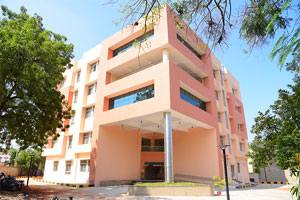
|
|
It is essential to have proper regulation or proper management of pesticides to protect the crops from harmful pests and at the same time safe-guard the human beings along with the environment. Pesticide Management provides appropriate advisories for scientific management of the pesticides. It deals with various approaches for safe use of pesticides throughout their life cycle viz., production, transport, storage, application and disposal, in view of the adverse impact they have on the agro-eco-systems, environment and human health. The Pesticide Management Division (PMD) of NIPHM imparts knowledge and skills in Pesticide Management through various capacity building programs to Insecticide Inspectors, Regulators, Insecticide Analysts, Extension Officials, Scientists etc.
The division has a state of the art training and analytical facilities accredited as per the ISO/IEC:17025-2017 for analysis and to provide hands on training on the operation of various equipment for the analysts during the training programs. The division is one among the 32 participating centres in the DAC funded Central sector scheme on “Monitoring of Pesticide Residues at National Level (MPRNL) initiated during 2005-06 to regularly monitor pesticide residues in food commodities. Pesticide Management Division of NIPHM is also notified laboratory and designated as CIL (No. GSR166 dated 12th March 2013) for the analysis of bio-pesticides under section 16 the Insecticides Act 1968. The samples of herbal or bio-products or organic pesticides or bio-pesticides drawn by the insecticide Inspectors under suspicion to contain chemical pesticides as per the provisions of Insecticide act,1968 are screened, quantified and analytical reports are sent. The Departments of Agriculture of various states throughout India are availing the facility at Pesticide Management Division for detecting adulteration/lacing of bio-pesticides with synthetic pesticides.
|
|
CORE ACTIVITIES OF PESTICIDE MANAGEMENT DIVISION
|
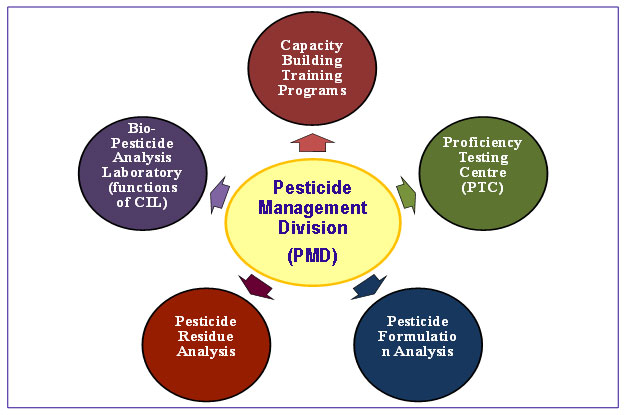
|
|
1 CAPACITY BUILDING
|
|
Pesticide Management Division continuously makes efforts to build the capacity in the following areas for the officials working in the Central and State Agricultural Departments, which in turn help the Analysts / officers to conduct Analysis effectively.
| |
| |
i. Pesticide Formulation Analysis (60 Days)
ii. Pesticide Residues Analysis (21 Days)
iii. Inspection, Sampling and Prosecution Procedures under Insecticide Act, 1968 (5 Days)
iv. Laboratory Quality System Management and Internal Audit as per ISO/IEC 17025:2017 (5 Days)
v. Testing of Physicochemical Properties of Pesticide Formulations (8 Days)
vi. Sampling methods of pesticide residue analysis (2 Days)
vii. Calibration of laboratory glassware and equipment for Pesticide Quality Testing Laboratories (8 Days)
viii. Sampling of Fruits, Vegetables and other items and Calibration of laboratory equipment for Pesticide Residue Analysis
ix. Documentation Procedures for NABL Accreditation for PTLs and RPTLs
x. Method Validation and Measurement of Uncertainty (5 Days)
xi. Training for Farmers
|
|
|
|
2. TESTING ANALYSIS
|
|
A. The laboratories of PMD designated as Pesticide Formulation and Residue Analytical Centre (PFRAC) are accredited by National Accreditation Board for Testing and Calibration Laboratories (NABL) as per ISO/IEC 17025:2017 in the field of chemical analysis (Accreditation Certificate No. TC-5338).
Scope of Accreditation as per ISO/IEC 17025:2017
| S No. |
Area of Analysis |
Tests under Accreditation |
|
1.
|
Pesticide formulation analysis (PFA)
|
34 pesticides technical
44 pesticide formulation
|
|
2.
|
General tests of Pesticide Formulations (PFA)
|
9 test parameters
|
|
3.
|
Pesticide Residue Analysis (PRA)
|
105 pesticides in fruits, Vegetables
137 pesticides in cereals, pulses, spices, condiments
40 pesticides in Water
|
|
4.
|
Screening of Bio pesticides for presence of chemical pesticides (Gazette Notified CIL activity)
|
105 pesticides
|
|
|
PFRAC is involved in the following Activities:
|
|
a) Pesticide Formulation Analysis:
|
|
Pesticide Formulation section of the PFRAC analyses samples of technical and formulations for active ingredient content as per the BIS methods. The laboratory also analyses the pesticide formulations for physico-chemical parameters such as acidity, suspensibility, emulsion stability, Particle size, Flash point as per the BIS procedures. The laboratory is well equipped with volumetric and instrumental analysis facilities such as GC-FID, HPLC-UV, FTIR and UV-Vis Spectrophotometer etc.
|
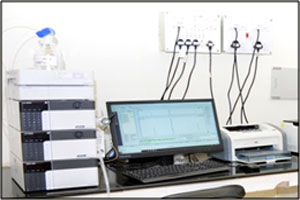
|

|
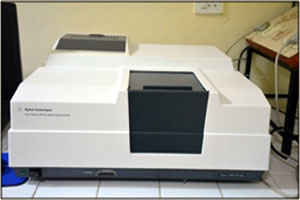
|
|
HPLC-UV-Vis
|
|
UV-Vis Spectrophotometer
|
| |
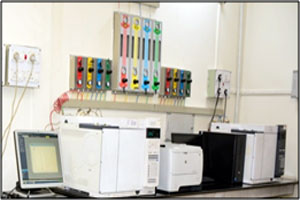
|

|
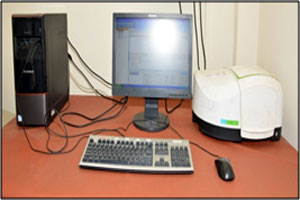
|
|
GC-FID
|
|
FT-IR
|
|
|
b) Pesticide Residue Analysis:
|
|
The division is one among the 32 participating centres in the DAC funded Central sector scheme on “Monitoring of Pesticide Residues at National Level (MPRNL) initiated during 2005-06 to regularly monitor pesticide residues in food commodities. Samples of fruits, vegetables, cereals, pulses, spices, milk and water are collected from local market and farm gate.
|
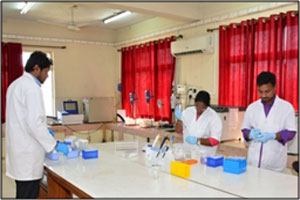
|

|
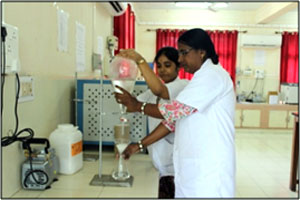
|
|
Sample Preparation for Pesticide Residue Analysis
|
| |
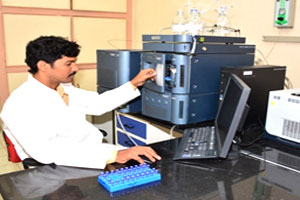
|

|
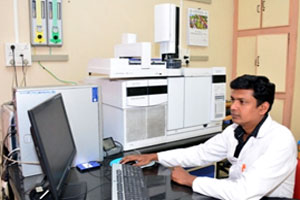
|
|
UPLC-MS/MS
|
|
GC-MS/MS
|
|
|
Pesticide residues in the said commodities are evaluated both qualitatively and quantitatively and test results are summarized on monthly basis to the Project Co-ordinator of MPRNL. The laboratory is well equipped with sophisticated analytical equipment like GC-MS/MS, LC-MS/MS, for confirmatory analysis.
The division also analyzes vegetable and fruit samples collected from various markets of Hyderabad, under the project “How Safe is Your Food from Farm?” The project aims at to verify the pesticide residues in consumable fruits and vegetables and make the data available for common public.
|
|
c) Bio-Product Analysis (CIL activity under IA,1968):
|
|
The pesticide market in India is filled with various kinds of chemical, biological pesticides and pesticides under the category of bioproducts (herbal products/plant stimulants). These bioproducts are sold without registration by Central Insecticide Board and Registration Committee (CIBRC) and some of these products are mixed with chemical pesticides. Unregistered pesticides from other countries are also sometimes mixed in these products through illegal imports and sold under the name of bio-products.
PFRAC is notified (Gazette Notification No: 132, Dt. 12-03-2013 of GOI) to function as Central Insecticide Laboratory (CIL) in respect of bio-products/bio-pesticides for presence of chemical pesticides under section 16 of Insecticide Act, 1968. Accordingly, the laboratory is analyzing the samples collected by Insecticide Inspectors throughout India for presence of chemical pesticides.
The laboratory uses a two coding system for maintaining the confidentiality of samples and uses validated methods coupled with Bureau of Indian Standard methods for ensuring the correct identification and quantification of pesticides in the bio-product samples.
The laboratory is equipped with latest equipment such as GC-MSMS, LC-MSMS, GC-Q-ToF, LC-Q-ToF and HPLC-PDA for screening and quantification of each sample of bio-products for around 200 chemical pesticide compounds.
|
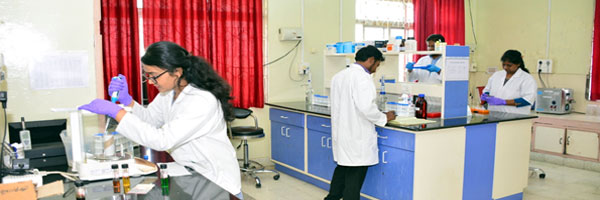
|
|
Sample Preparation for Analysis of Bioproduct
|
| |
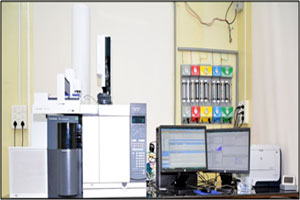
|

|
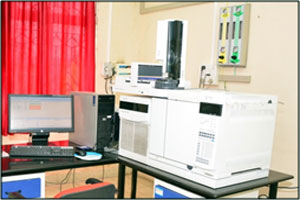
|
|
GC-Q-ToF
|
|
GC-MS/MS
|
| |
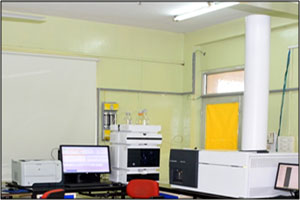
|

|
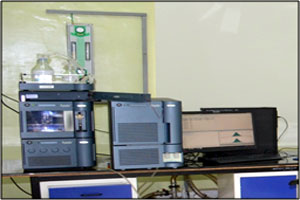
|
|
LC-Q-ToF
|
|
LC-MS/MS
|
|
|
B. Heavy Metals Analysis: PMD is equipped with Inductively Coupled Plasma Optical Emission Spectrometry (ICP-OES) and related infrastructure for analysis of Heavy Metals. The division collects around 25 samples of water and leafy vegetables in every month and analyze for presence of different Heavy Metals.
|
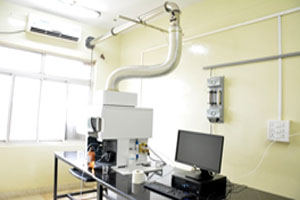
|
|
ICP-OES
|
|
|
3. PROFICIENCY TESTING
|
|
Participation in Proficiency Testing (PT) is considered as an important parameter of a laboratory’s Quality Management System and is mandatory as per ISO/IEC 17025 guidelines. Proficiency Testing Centre (PTC) of PMD, NIPHM conducts Proficiency Testing Programs in the field of Pesticide Formulation and Residue Analysis.
The PTC is accredited in accordance with the ISO/IEC 17043:2010 (Conformity Assessment–General requirements for Proficiency Testing) as Proficiency Testing Provider in the field of Chemical Testing by NABL w.e.f. 24-05-2016 (Accreditation Certificate No.PC-1013).
Scope of Accreditation of PTC
| S No. |
Area of Analysis |
Tests |
|
1.
|
Pesticide Residues in Water
|
25 pesticides
|
|
2.
|
Pesticide Residues in Fruits, Vegetables
|
36 pesticides
|
|
3.
|
Pesticide Residues in Cereals and Pulses
|
22 pesticides
|
|
4.
|
Pesticide Technical analysis
|
11 technical
|
|
5.
|
Pesticide formulation analysis
|
20 formulations
|
|
6.
|
Physicochemical tests in formulation analysis
|
8 parameters
|
|
|
The PTC conducts around 4-6 PT programs in Pesticide Formulation Analysis 4-5 PT Programs in Pesticide Residue Analysis (PT Calendar for the year 2021-22) .
|
|
Scope of Accreditation of PTC
|
| |
Proficiency Testing in Pesticide Residue Analysis
|



